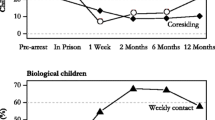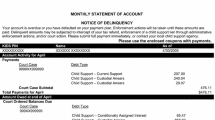Abstract
High U.S. incarceration rates have motivated recent research on the negative effects of imprisonment on later employment, earnings, and family relationships. Because most men in jail and prison are fathers, a large number of children may be placed at considerable risk by policies of incarceration. This article examines one dimension of the economic risk faced by children of incarcerated fathers: the reduction in the financial support that they receive. We use a population-based sample of urban children to examine the effects of incarceration on this support. Both cross-sectional and longitudinal regressions indicate that formerly incarcerated men are less likely to contribute to their families, and those who do contribute provide significantly less. The negative effects of incarceration on fathers’ financial support are due not only to the low earnings of formerly incarcerated men but also to their increased likelihood to live apart from their children. Men contribute far less through child support (formal or informal) than they do when they share their earnings within their household, suggesting that the destabilizing effects of incarceration on family relationships place children at significant economic disadvantage.
Similar content being viewed by others
Notes
Such “indirect reports” include either parent reporting that their relationship had ended as a result of the father’s incarceration, that the father had been sent to jail for child support nonpayment, and several other indicators that he had spent time in jail or prison. Although a jail sentence for child support nonpayment may be applied for reasons endogenous to later financial contributions, the proportion of men incarcerated for this reason is quite small (79 of approximately 2,000 men with incarceration histories). Moreover, several of these men were also incarcerated at other times for reasons unrelated to child support. We therefore retain all men in our sample who have been incarcerated, concluding that any estimated effects of incarceration are not driven by endogeneity associated with jail sentences for child support nonpayment.
Some fathers either are not surveyed or refuse to answer questions on criminal history. While mothers’ reports of incarceration (or non-incarceration) will supersede her partner’s lack of an answer, if neither parent provides a yes-or-no answer for a time period, the fathers’ incarceration status will be analyzed as unknown.
Results are available upon request.
References
Anderson, E. (1999). Code of the street: Decency, violence, and the moral life of the inner city. New York: W. W. Norton & Company.
Arditti, J. A., Smock, S. A., & Parkman, T. S. (2005). “It’s been hard to be a father”: A qualitative exploration of incarcerated fatherhood. Fathering, 3, 267–288.
Betson, D. (2006). Parental expenditures on children: Rothbarth estimates. Denver: Policy Studies, Inc.
Bloom, D. (2006). Employment-focused programs for ex-prisoners: What have we learned, what are we learning, and where should we go from here? Background paper prepared for the meeting, Research on Prisoner Reentry: What Do We Know and What Do We Want to Know. Gerald R. Ford School of Public Policy, University of Michigan, May 24.
Braman, D. S. (2004). Doing time on the outside: Incarceration and family life in urban America. Ann Arbor, MI: University of Michigan Press.
Bushway, S. (2004). Labor market effects of permitting employer access to criminal history records. Journal of Contemporary Criminal Justice, 20, 276–291.
Comfort, M. (2008). Doing time together: Love and family in the shadow of the prison. Chicago: University of Chicago Press.
Council of State Governments. (2009). Repaying debts. New York: Council of State Governments. Available online at http://tools.reentrypolicy.org/repaying_debts.
Dickman, S. J. (1990). Functional and dysfunctional impulsivity: Personality and cognitive correlates. Journal of Personality and Social Psychology, 58, 95–102.
Edin, K. (2000). Few good men: Why poor mothers don’t marry or remarry. American Prospect, 11, 26–31.
Edin, K., Nelson, T. J., & Paranal, R. (2004). Fatherhood and incarceration as potential turning points in the criminal careers of unskilled men. In M. Patillo, D. F. Weiman, & B. Western (Eds.), Imprisoning America: The social effects of mass incarceration (pp. 46–75). New York: Russell Sage.
Fagan, J., & Freeman, R. (1999). Crime and work. Crime and Justice, 25, 225–290.
Farrington, D. P. (1998). Predictors, causes, and correlates of male youth violence. Crime and Justice, 24, 421–475.
Foster, H., & Hagan, J. (2007). Incarceration and intergenerational social exclusion. Social Problems, 54, 399–433.
Freeman, R. (1996). Why do so many young Americans commit crimes and what might we do about it? The Journal of Economic Perspectives, 10, 25–42.
Geller, A., Garfinkel, I., Cooper, C. E., & Mincy, R. B. (2009). Parental incarceration and child wellbeing: Implications for urban families. Social Science Quarterly, 90, 1186–1202.
Golub, A., Johnson, B. D., Taylor, A., & Liberty, H. J. (2002). The validity of arrestees’ self-reports: Variations across questions and persons. Justice Quarterly, 19, 477–502.
Gottfredson, M. R., & Hirschi, T. (1990). A general theory of crime. Stanford, CA: Stanford University Press.
Hagan, J., & Dinovitzer, R. (1999). Collateral consequences of imprisonment for children, communities, and prisoners. Crime and Justice, 26, 121–162.
Hairston, C. F. (1998). The forgotten parent. Understanding the forces that influence incarcerated fathers’ relationships with their children. Child Welfare, 77, 617–639.
Holzer, H. J. (2007). Collateral costs: The effects of incarceration on the employment and earnings of young workers (IZA Discussion Paper 3118). Bonn, Germany: Institute for the Study of Labor.
Holzer, H. J., Raphael, S., & Stoll, M. A. (2003). Employment barriers facing ex-offenders. Paper presented at the Urban Institute Reentry Roundtable, Employment Dimensions of Re-Entry: Understanding the Nexus Between Prisoner Reentry and Work, New York, May 19–20.
Jacobs, E., & Western, B. (2007). Report on the evaluation of the ComALERT prisoner reentry program. Brooklyn: Kings County District Attorney.
Johnston, D. (2006). The wrong road: Efforts to understand the effects of parental crime and incarceration. Criminology and Public Policy, 5, 703–720.
Kling, J. (2006). Incarceration length, employment, and earnings. The American Economic Review, 86, 863–876.
Lindquist, C., & Bir, A. (2008). The National evaluation of the responsible fatherhood, marriage, and family strengthening grants for incarcerated and re-entering fathers and their partners: Program overview and evaluation summary. Washington, DC: U.S. Department of Health and Human Services.
Lopoo, L., & Western, B. (2006). Incarceration, marriage, and family life. In B. Western (Ed.), Punishment and inequality in America (pp. 131–167). New York: Russell Sage.
Mumola, C. J. (2006). Parents under correctional supervision: National statistics. Presented at the conference, Children of parents in the criminal justice system: Children at risk, November 6, Bethesda, MD.
Myers, S. L., Jr. (1980). The rehabilitation effect of punishment. Economic Inquiry, 18, 353–366.
Myers, S. L., Jr. (1983). Estimating the economic model of crime: Employment versus punishment effects. Quarterly Journal of Economics, 98, 157–166.
National Corrections Reporting Program. (2003). Time served in state prison, by offense, release type, gender, and race. Available online at http://bjs.ojp.usdoj.gov/index.cfm?ty=pbdetail&iid=2045.
Nepomnyaschy, L. (2007). Child support and father-child contact: Testing reciprocal pathways. Demography, 44, 93–112.
Nepomnyaschy, L., & Garfinkel, I. (2009). Child support enforcement and fathers’ contributions to their nonmarital children (CRCW Working Paper 2006-09-FF). Princeton, NJ: Center for Research on Child Wellbeing, Princeton University.
Pager, D. (2003). The mark of a criminal record. The American Journal of Sociology, 108, 937–975.
Parke, R., & Clarke-Stewart, K. A. (2002). Effects of parental incarceration on young children. Paper prepared for the conference, “From Prison to Home,” January 30–31, U.S. Department of Health and Human Services, Washington, DC.
Petersilia, J. (2003). When prisoners come home: Parole and prisoner reentry. New York: Oxford University Press.
Phillips, S. D., Erkanli, A., Keeler, G. P., Costello, E. J., & Angold, A. (2006). Disentangling the risks: Parent criminal justice involvement and children’s exposure to family risks. Criminology and Public Policy, 5, 677–702.
Reichman, N., Teitler, J., Garfinkel, I., & McLanahan, S. (2001). Fragile families: Sample and design. Child and Youth Services Review, 23, 303–326.
Reuter, P. H., MacCoun, R. J., Murphy, P., Abrahamse, A., & Simon, B. (1990). Money from crime: A study of the economics of drug dealing in Washington, DC. Santa Monica, CA: RAND.
Roy, K. M., & Dyson, O. L. (2005). Gatekeeping in context: Babymama drama and the involvement of incarcerated fathers. Fathering, 3, 267–288.
Saylor, W. G., & Gaes, G. G. (1997). PREP: Training inmates through industrial work participation, and vocational and apprenticeship instruction. Corrections Management Quarterly, 1, 32–43.
Travis, J. (2005). But they all come back: Facing the challenges of prisoner reentry. Washington, DC: Urban Institute.
Western, B. (2002). The impact of incarceration on wage mobility and inequality. American Sociological Review, 67, 526–546.
Western, B. (2006). Punishment and inequality in America. New York: Russell Sage.
Western, B., Kling, J. R., & Weiman, D. F. (2001). The labor market consequences of incarceration. Crime and Delinquency, 47, 410–427.
Western, B., & Wildeman, C. (2009). The black family and mass incarceration. The Annals of the American Academy of Political and Social Science, 621, 221–242.
Wilbur, M. B., Marani, J. E., Appugliese, D., Woods, R., Siegel, J. A., Cabral, H. J., et al. (2007). Socioemotional effects of fathers’ incarceration on low-income, urban, school-aged children. Pediatrics, 120, e678–e685.
Wildeman, C. (2009). Parental imprisonment, the prison boom, and the concentration of childhood disadvantage. Demography, 46, 265–280.
Acknowledgments
This research was funded by the Annie E. Casey Foundation. The authors thank the Foundation for its support, but acknowledge that the findings and conclusions in presented in this article are those of the authors alone, and do not necessarily represent the opinions of the Foundation. The Fragile Families and Child Wellbeing Study was supported by Grant R01HD36916 from the National Institute of Child Health and Human Development. The contents of the article are solely the responsibility of the authors and do not necessarily represent the official views of the National Institute of Child Health and Human Development. The authors are grateful for the constructive feedback of Herbert Smith and Mark Kleiman, participants in the Fragile Families Working Group, and two anonymous referees.
Author information
Authors and Affiliations
Corresponding author
Rights and permissions
About this article
Cite this article
Geller, A., Garfinkel, I. & Western, B. Paternal Incarceration and Support for Children in Fragile Families. Demography 48, 25–47 (2011). https://doi.org/10.1007/s13524-010-0009-9
Published:
Issue Date:
DOI: https://doi.org/10.1007/s13524-010-0009-9




